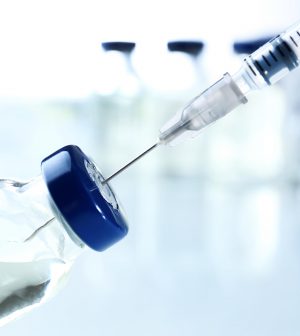- The Long-Term Effects of Daily Turmeric Supplements on Liver Health
- Could Your Grocery Store Meat Be Causing Recurring UTIs?
- Are You Making This Expensive Thermostat Error This Winter?
- Recognizing the Signs of Hypothyroidism
- 10 Strategies to Overcome Insomnia
- Could Artificial Sweeteners Be Aging the Brain Faster?
- Techniques for Soothing Your Nervous System
- Does the Water in Your House Smell Funny? Here’s Why
- Can a Daily Dose of Apple Cider Vinegar Actually Aid Weight Loss?
- 6 Health Beverages That Can Actually Spike Your Blood Sugar
Getting COVID Booster Helps Your Antibodies Last Longer

While getting a COVID-19 vaccine provides antibodies against the coronavirus, getting a booster shot creates a longer-lasting antibody response, according to new research.
“These results fit with other recent reports and indicate that booster shots enhance the durability of vaccine-elicited antibodies,” said senior researcher Dr. Jeffrey Wilson of the University of Virginia (UVA) Health division of asthma, allergy and immunology, in Charlottesville.
“Although only about half of the U.S. population that is eligible for a booster has received one, it is increasingly clear that boosters enhance the protection that is conferred by the primary series mRNA vaccines alone,” Wilson said in a university news release.
In the study of almost 350 volunteers, getting an mRNA booster (from drugmakers Pfizer or Moderna) made for longer-lasting antibodies for all recipients, the investigators found. That was even true for those who had recovered from a COVID-19 infection.
The researchers worked with 117 UVA employee volunteers who had a booster shot and another 228 volunteers who had just a primary vaccine series of two shots.
The study results revealed similar antibody levels in both groups about one week to 31 days after their shots. The boosted antibodies then lasted longer.
“Our initial thought was that boosters would lead to higher antibody levels than the primary vaccine series, but that was not what we found,” said co-author Samuel Ailsworth. “Instead, we found that the booster led to longer-lasting antibodies.”
Both of the mRNA vaccine boosters provide enhanced levels of protection, but Moderna’s antibody levels exceeded Pfizer’s through the five-month study period.
COVID-19 infections were high in the community at the time boosters were being given. In studying those who also had a COVID infection, the researchers found that the “enhanced antibody durability observed after booster vaccination was not explained by hybrid immunity.”
Wilson’s research team previously found that antibodies from the primary vaccination series made by Pfizer declined faster than those made by Moderna. They also found that older recipients of the Pfizer vaccine generated fewer antibodies than younger recipients, but that difference faded over time. Age wasn’t a factor with antibodies in the Moderna vaccine.
The study findings were recently published in the journal Annals of Allergy, Asthma & Immunology.
More information
The U.S. Centers for Disease Control and Prevention has more on COVID-19 boosters.
SOURCE: University of Virginia School of Medicine, news release, Dec. 21, 2022
Source: HealthDay
Copyright © 2026 HealthDay. All rights reserved.










